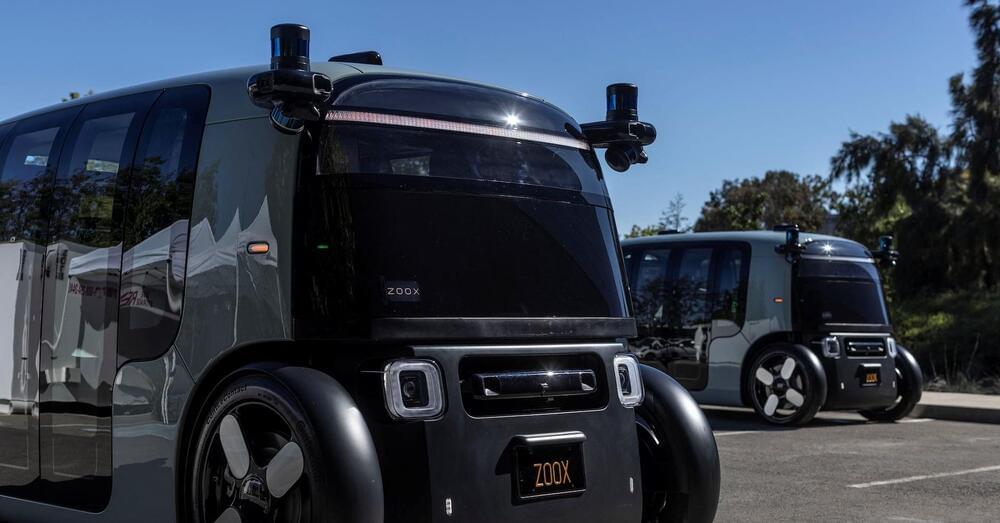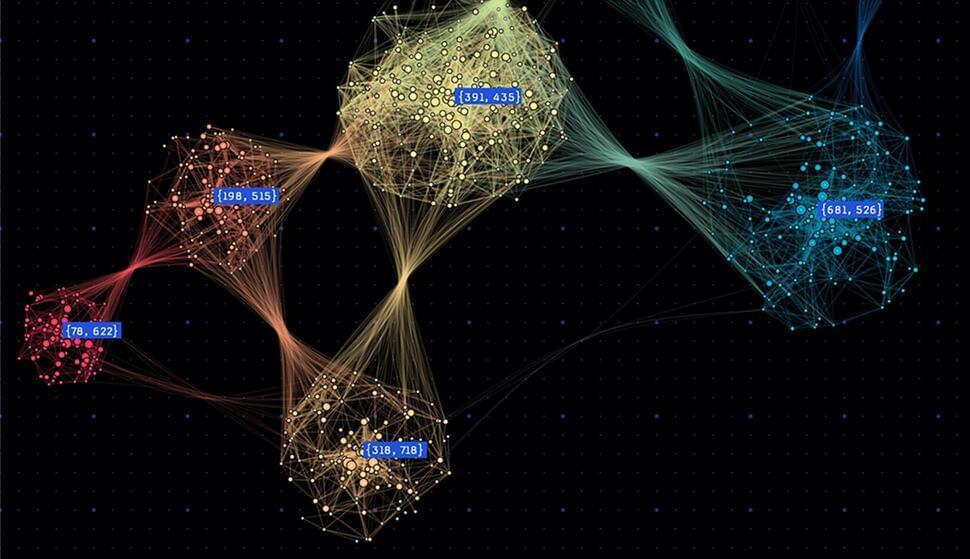Bill Gates said current AI models need “data that embodies the expertise,” such as in pharmaceuticals or agriculture, in order to succeed.


All non-Google chat GPTs affected by side channel that leaks responses sent to users.

Amazon.com’s self-driving car unit, Zoox, is seeking to stay abreast of rival Waymo by expanding its vehicles’ testing in California and Nevada to include a wider area, higher speeds and nighttime driving.
ANYmal is a truly remarkable robot, capable of standing and lifting things like a humanoid, or slinking around on all fours like a quadruped, with or without wheels. But what’s really surprised us now is the eerie grace it’s starting to move with.

Their AI is able to recognize patterns in complex data sets and to formulate them in a physical theory. The development of a new theory is typically associated with the greats of physics. You might think of Isaac Newton or Albert Einstein, for example. Many Nobel Prizes have already been awarded for new theories. Researchers at Forschungszentrum Jülich have now programmed an artificial intelligence that has also mastered this feat. Their AI is able to recognize patterns in complex data sets and to formulate them in a physical theory.
In the following interview, Prof. Moritz Helias from Forschungszentrum Jülich’s Institute for Advanced Simulation (IAS-6) explains what the “Physics of AI” is all about and to what extent it differs from conventional approaches.
Figure has demonstrated the first fruit of its collaboration with OpenAI to enhance the capabilities of humanoid robots. In a video released today, the Figure 1 bot is seen conversing in real-time.
The development progress at Figure is nothing short of extraordinary. Entrepreneur Brett Adcock only emerged from stealth last year, after gathering together a bunch of key players from Boston Dynamics, Tesla Google DeepMind and Archer Aviation to “create the world’s first commercially viable general purpose humanoid robot.”
By October, the Figure 1 was already up on its feet and performing basic autonomous tasks. By the turn of the year, the robot had watch-and-learn capabilities, and was ready to enter the workforce at BMW by mid-January.
The Schwartz Reisman Institute for Technology and Society and the Department of Computer Science at the University of Toronto, in collaboration with the Vector Institute for Artificial Intelligence and the Cosmic Future Initiative at the Faculty of Arts \& Science, present Geoffrey Hinton on October 27, 2023, at the University of Toronto.
0:00:00 — 0:07:20 Opening remarks and introduction.
0:07:21 — 0:08:43 Overview.
0:08:44 — 0:20:08 Two different ways to do computation.
0:20:09 — 0:30:11 Do large language models really understand what they are saying?
0:30:12 — 0:49:50 The first neural net language model and how it works.
0:49:51 — 0:57:24 Will we be able to control super-intelligence once it surpasses our intelligence?
0:57:25 — 1:03:18 Does digital intelligence have subjective experience?
1:03:19 — 1:55:36 Q\&A
1:55:37 — 1:58:37 Closing remarks.
Talk title: “Will digital intelligence replace biological intelligence?”
Abstract: Digital computers were designed to allow a person to tell them exactly what to do. They require high energy and precise fabrication, but in return they allow exactly the same model to be run on physically different pieces of hardware, which makes the model immortal. For computers that learn what to do, we could abandon the fundamental principle that the software should be separable from the hardware and mimic biology by using very low power analog computation that makes use of the idiosynchratic properties of a particular piece of hardware. This requires a learning algorithm that can make use of the analog properties without having a good model of those properties. Using the idiosynchratic analog properties of the hardware makes the computation mortal. When the hardware dies, so does the learned knowledge. The knowledge can be transferred to a younger analog computer by getting the younger computer to mimic the outputs of the older one but education is a slow and painful process. By contrast, digital computation makes it possible to run many copies of exactly the same model on different pieces of hardware. Thousands of identical digital agents can look at thousands of different datasets and share what they have learned very efficiently by averaging their weight changes. That is why chatbots like GPT-4 and Gemini can learn thousands of times more than any one person. Also, digital computation can use the backpropagation learning procedure which scales much better than any procedure yet found for analog hardware. This leads me to believe that large-scale digital computation is probably far better at acquiring knowledge than biological computation and may soon be much more intelligent than us. The fact that digital intelligences are immortal and did not evolve should make them less susceptible to religion and wars, but if a digital super-intelligence ever wanted to take control it is unlikely that we could stop it, so the most urgent research question in AI is how to ensure that they never want to take control.
About Geoffrey Hinton.
Geoffrey Hinton received his PhD in artificial intelligence from Edinburgh in 1978. After five years as a faculty member at Carnegie Mellon he became a fellow of the Canadian Institute for Advanced Research and moved to the Department of Computer Science at the University of Toronto, where he is now an emeritus professor. In 2013, Google acquired Hinton’s neural networks startup, DNN research, which developed out of his research at U of T. Subsequently, Hinton was a Vice President and Engineering Fellow at Google until 2023. He is a founder of the Vector Institute for Artificial Intelligence where he continues to serve as Chief Scientific Adviser.

Chinese ambassador Chen Xu called for the high-quality development of artificial intelligence (AI), assistance in promoting children’s mental health, and protection of children’s rights while delivering a joint statement on behalf of 80 countries at the 55th session of the United Nations Human Rights Council (UNHRC) on Thursday.
Chen, China’s permanent representative to the UN Office in Geneva and other international organizations in Switzerland, said that artificial intelligence is a new field of human development and should adhere to the concept of consultation, joint construction, and shared benefits, while working together to promote the governance of artificial intelligence.
The new generation of children has become one of the main groups using and benefiting from AI technology. The joint statement emphasized the importance of children’s mental health issues.

🧠 New Graph Neural Network Technique 🔥
NVIDIA researchers developed WholeGraphStor, a novel #GNN memory optimization.
Storing entire graphs in a compressed format reduces memory footprint,…
Graph neural networks (GNNs) have revolutionized machine learning for graph-structured data. Unlike traditional neural networks, GNNs are good at capturing intricate relationships in graphs, powering applications from social networks to chemistry. They shine particularly in scenarios like node classification, where they predict labels for graph nodes, and link prediction, where they determine the presence of edges between nodes.
Processing large graphs in a single forward or backward pass can be computationally expensive and memory-intensive.
The workflow for large-scale GNN training typically starts with subgraph sampling to use mini-batch training. This entails feature gathering to capture needed contextual information in a subgraph. Following these, the extracted features and subgraphs are employed in neural network training. This stage is where GNNs showcase proficiency in aggregating information and enabling the iterative propagation of node knowledge.
There is a new AI tool so smart that it can write code, create websites, and software with just a single prompt. Devin, created by the tech company Cognition, is the first AI software engineer. It can do pretty much everything you ask it to do. And the AI tool does not come with the intention to replace human engineers, it is designed to work hand-in-hand with them. The makers say that the AI tool has not been launched to replace human engineers but to make their lives easier.
“Today we’re excited to introduce Devin, the first AI software engineer. Devin is the new state-of-the-art on the SWE-Bench coding benchmark, has successfully passed practical engineering interviews from leading AI companies, and has even completed real jobs on Upwork. Devin is an autonomous agent that solves engineering tasks through the use of its own shell, code editor, and web browser,” Cognition posted on Twitter aka X.
What makes Devin stand out is its incredible ability to think ahead and plan complex tasks. It can make thousands of decisions, learn from its mistakes, and get better over time. Plus, it has all the tools a human engineer needs, like a code editor and browser, right at its digital fingertips. Devin is considered the most advanced or cutting-edge solution available for evaluating software engineering tasks based on the SWE-bench coding benchmark. Essentially, it performed exceptionally well compared to other solutions when tested against a standard set of software engineering problems. The AI tool performed well in practical engineering interviews conducted by top artificial intelligence companies. These interviews likely involved tasks and challenges relevant to the field of AI and software engineering, and the AI assistant managed to meet expectations.